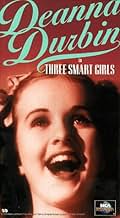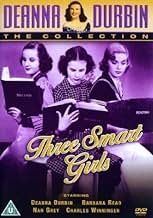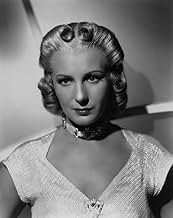VALUTAZIONE IMDb
6,6/10
1639
LA TUA VALUTAZIONE
Aggiungi una trama nella tua linguaThree sisters scheme to reunite their divorced parents before their wealthy father marries a conniving gold digger.Three sisters scheme to reunite their divorced parents before their wealthy father marries a conniving gold digger.Three sisters scheme to reunite their divorced parents before their wealthy father marries a conniving gold digger.
- Regia
- Sceneggiatura
- Star
- Candidato a 3 Oscar
- 2 vittorie e 4 candidature totali
John 'Dusty' King
- Bill Evans
- (as John King)
Wade Boteler
- Police Sergeant
- (non citato nei titoli originali)
Lane Chandler
- Police Officer Jack
- (non citato nei titoli originali)
Charles Coleman
- Stevens
- (non citato nei titoli originali)
Joyce Compton
- Judson's Secretary
- (non citato nei titoli originali)
James Conaty
- Extra in Restaurant
- (non citato nei titoli originali)
Recensioni in evidenza
It has been said that Deanna Durbin invented teenagery. This first film was one of the best. The humorous story presented a delightful 14 year old Deanna, a little beauty with a gorgeous voice, as the "Miss Fixit" in a family split by divorce. For plot summary, see other IMDb entries, but quickly Deanna and her two older sisters plan to go to America from Switzerland to prevent their father from remarrying. With an excellent supporting cast especially Barbara Read and Nan Grey as the sisters, good direction and editing, the film succeeds in captivating one even on subsequent viewings. Of Deanna's three songs, only "Il Bacio" is from the classical repertoire, but when she sings it in that police station scene, the film's place in history is assured. At least it was for this viewer who at the age of 15 was smitten for life with both Deanna and classical music. One of the many nice touches that occur throughout THREE SMART GIRLS is the brief glimpse of the drunk stretching his neck for a final glimpse of Deanna as the cops hustle him by! One unfortunate result of the success of this film was that subsequent writers for Durbin vehicles became locked into the "Miss Fixit" theme, which quickly became stale. Deanna herself never did. Her stature as an actress is more questionable than her charisma, which she certainly had. It seems to me that, like many another film personality, she substituted "naturalness" for the histrionic ability that she lacked. The ploy worked well for 21 feature films.
THREE SMART GIRLS (Universal, 1936), directed by Henry Koster, gives indication as a movie set in a classroom revolving around three intellectual students competing in keeping their names on the honor roll or dean's list. Though it does present three school age teenagers as major attractions, it's basically an uplifting story serving as a promotion for three bright stars in the making: Barbara Read, Nan Grey and "Universal's Newest Discovery," Deanna Durbin. Aside from her special billing in the opening credits, Durbin acquires enough attention and close-ups to come as no surprise which one of the "three smart girls" is to become an overnight sensation.
The story introduces three teenage sisters, Kay (Barbara Read), Joan (Nan Grey) and Penny (Deanna Durbin) living together in the country home in Switzerland with their mother, Dorothy (Nella Walker) and housekeeper, Martha (Lucile Watson). Through a newspaper article, the girls find, to their displeasure, that their New York millionaire banker father, Judson Craig (Charles Winninger), whom their mother divorced ten years ago, intends to marry, Donna Lyons Binnie Barnes), a young socialite he affectionately calls "Precious." Donna, along with her mother (Alice Brady), it turns out, are actually fortune hunters after Craig's money. Because this news has hurt their mother, who still loves him, Penny suggests paying Daddy a visit to break up this union. With "Mummy" remaining in Switzerland, the girls, accompanied by Martha, take the next boat to New York, after which they surprise both Daddy and his future bride-to-be while dining in an exclusive restaurant. A series of schemes and mishaps follow, including the hiring of Count Arisztid (hilariously played by Mischa Auer), a drunken unemployed Hungarian gigolo, to woo Miss Lyons. Along the way, the elder sisters encounter young men of interest, Bill Evans (John King), who manages Craig's investments; and Lord Michael Stewart(Ray Milland).
Reportedly a huge success for Universal, earning an Academy Award nomination as Best Picture of 1936, it shows how important it was for both studio and 14-year-old Deanna Durbin. Being her feature film debut, with only the musical short, "Every Sunday" (MGM, 1936) opposite Judy Garland, to her credit, Durbin turned out to be one smart girl for this production. Energetic, vibrant and talented in the singing category, she opens the film singing "My Heart is Singing" while rowing the sailboat with her sisters. "Someone to Care for Me" (by Gus Kahn, Walter Jurman and Bronislau Kaper) started off earlier with Binnie Barnes attempt to sing while entertaining her guests, in turn serving Durbin to advantage singing it to her father (Winninger). Durbin's final number is the classical piece, "Il Bacio" where she sings in a police station for the police chief (John Hamilton).
With other capable performers in the cast, Ernest Cossart co-stars as Craig's manservant, Binns; Charles Coleman (Stevens, the butler); Franklin Pangborn (The Jeweler); and Hobart Cavanaugh (Wilbur Lamb, one of Craig's assistants).
One of the most revived Durbin films to air on commercial television during the 1960s, THREE SMART GIRLS turned up quite frequently on cable channel American Movie Classics (1993-1996) before shifting over to Turner Classic Movies where it premiered January 14, 2007. Prior to that, THREE SMART GIRLS did get further exposure when distributed to home video in the 1990s. Interestingly, when displayed to DVD a decade later, it became a companion piece with a much latter Durbin musical, SOMETHING IN THE WIND (1947) instead of its sequels, THREE SMART GIRLS GROW UP (1939) and HERS TO HOLD (1943). As popular as the original turned out to be, with its blend of music, comedy and sentiment, the sequels were equally successful, though virtually forgotten due to limited television revivals or hard to find VHS copies.
THREE SMART GIRLS not only opened a whole new career for Deanna Durbin, but marked the beginning of a whole new cycle of teenage movies later carried on by Judy Garland and others over where Durbin actually got her start, Metro-Goldwyn-Mayer. (***)
The story introduces three teenage sisters, Kay (Barbara Read), Joan (Nan Grey) and Penny (Deanna Durbin) living together in the country home in Switzerland with their mother, Dorothy (Nella Walker) and housekeeper, Martha (Lucile Watson). Through a newspaper article, the girls find, to their displeasure, that their New York millionaire banker father, Judson Craig (Charles Winninger), whom their mother divorced ten years ago, intends to marry, Donna Lyons Binnie Barnes), a young socialite he affectionately calls "Precious." Donna, along with her mother (Alice Brady), it turns out, are actually fortune hunters after Craig's money. Because this news has hurt their mother, who still loves him, Penny suggests paying Daddy a visit to break up this union. With "Mummy" remaining in Switzerland, the girls, accompanied by Martha, take the next boat to New York, after which they surprise both Daddy and his future bride-to-be while dining in an exclusive restaurant. A series of schemes and mishaps follow, including the hiring of Count Arisztid (hilariously played by Mischa Auer), a drunken unemployed Hungarian gigolo, to woo Miss Lyons. Along the way, the elder sisters encounter young men of interest, Bill Evans (John King), who manages Craig's investments; and Lord Michael Stewart(Ray Milland).
Reportedly a huge success for Universal, earning an Academy Award nomination as Best Picture of 1936, it shows how important it was for both studio and 14-year-old Deanna Durbin. Being her feature film debut, with only the musical short, "Every Sunday" (MGM, 1936) opposite Judy Garland, to her credit, Durbin turned out to be one smart girl for this production. Energetic, vibrant and talented in the singing category, she opens the film singing "My Heart is Singing" while rowing the sailboat with her sisters. "Someone to Care for Me" (by Gus Kahn, Walter Jurman and Bronislau Kaper) started off earlier with Binnie Barnes attempt to sing while entertaining her guests, in turn serving Durbin to advantage singing it to her father (Winninger). Durbin's final number is the classical piece, "Il Bacio" where she sings in a police station for the police chief (John Hamilton).
With other capable performers in the cast, Ernest Cossart co-stars as Craig's manservant, Binns; Charles Coleman (Stevens, the butler); Franklin Pangborn (The Jeweler); and Hobart Cavanaugh (Wilbur Lamb, one of Craig's assistants).
One of the most revived Durbin films to air on commercial television during the 1960s, THREE SMART GIRLS turned up quite frequently on cable channel American Movie Classics (1993-1996) before shifting over to Turner Classic Movies where it premiered January 14, 2007. Prior to that, THREE SMART GIRLS did get further exposure when distributed to home video in the 1990s. Interestingly, when displayed to DVD a decade later, it became a companion piece with a much latter Durbin musical, SOMETHING IN THE WIND (1947) instead of its sequels, THREE SMART GIRLS GROW UP (1939) and HERS TO HOLD (1943). As popular as the original turned out to be, with its blend of music, comedy and sentiment, the sequels were equally successful, though virtually forgotten due to limited television revivals or hard to find VHS copies.
THREE SMART GIRLS not only opened a whole new career for Deanna Durbin, but marked the beginning of a whole new cycle of teenage movies later carried on by Judy Garland and others over where Durbin actually got her start, Metro-Goldwyn-Mayer. (***)
Although she is little known today, Deanna Durbin was one of the most popular stars of the 1930s, a pretty teenager with a perky personality and a much-admired operatic singing voice. This 1937 was her first major film, and it proved a box-office bonanza for beleaguered Universal Studios.
THREE SMART GIRLS concerns three daughters of a divorced couple who rush to their long-unseen father when their still-faithful mother reveals he may soon remarry--with the firm intention of undermining his gold-digger girlfriend and returning him to their mother. Although the story is slight, the script is witty and the expert cast plays it with a neat screwball touch. Durbin has a pleasing voice and appealing personality, and such enjoyable character actors as Charles Winninger, Alice Brady, Lucile Watson, and Mischa Auer round out the cast. A an ultra-light amusement for fans of 1930s film.
Gary F. Taylor, aka GFT, Amazon Reviewer
THREE SMART GIRLS concerns three daughters of a divorced couple who rush to their long-unseen father when their still-faithful mother reveals he may soon remarry--with the firm intention of undermining his gold-digger girlfriend and returning him to their mother. Although the story is slight, the script is witty and the expert cast plays it with a neat screwball touch. Durbin has a pleasing voice and appealing personality, and such enjoyable character actors as Charles Winninger, Alice Brady, Lucile Watson, and Mischa Auer round out the cast. A an ultra-light amusement for fans of 1930s film.
Gary F. Taylor, aka GFT, Amazon Reviewer
Cute film about three lively sisters from Switzerland (often seen running about in matching outfits) who want to get their parents back together (seems mom is still carrying the torch for dad) - so they sail off to New York to stop the dad from marrying a blonde gold-digger he calls "Precious". Dad hasn't seen his daughters in ten years, they (oddly enough) don't seem to mind and think he's wonderful, and meanwhile Precious seems to lead a life mainly run by her overbearing mother (Alice Brady), a woman who just wants to see to it her daughter marries a rich man. The sisters get the idea of pushing Precious into the path of a drunken Hungarian count, tricking the two gold-digging women into thinking he is one of the richest men in Europe. But a case of mistaken identity makes the girls think the count is good-looking Ray Milland, who goes along with the scheme 'cause he has a crush on sister Kay.
This film is enjoyable, light fare. Barbara Read as Kay comes across as sweet and pretty, Ray Milland looks oh so young and handsome here (though, unfortunately, is given little to do), Alice Brady is quite good as the scheming mother - but it is Deanna Durbin, a real charmer and cute as a button playing youngest sister Penny, who pretty much steals the show. With absolutely beautiful vocals, she sings several songs throughout the film, though I actually would have liked to have seen them feature her even more in this. The plot in this film is a bit silly, but nevertheless, I found the film to be entertaining and fun.
This film is enjoyable, light fare. Barbara Read as Kay comes across as sweet and pretty, Ray Milland looks oh so young and handsome here (though, unfortunately, is given little to do), Alice Brady is quite good as the scheming mother - but it is Deanna Durbin, a real charmer and cute as a button playing youngest sister Penny, who pretty much steals the show. With absolutely beautiful vocals, she sings several songs throughout the film, though I actually would have liked to have seen them feature her even more in this. The plot in this film is a bit silly, but nevertheless, I found the film to be entertaining and fun.
This charming, funny movie combines Deanna Durbin's numerous talents with a far-fetched but enjoyable story, a set of interesting characters, and a cast and settings that make it all work. It combines the feel of the old screwball comedies with a little of the pace of a vintage musical, and a dash of commentary on family life. The combination works well, and is not as easy as it looks, as is so often demonstrated by the numerous gauche, hammy "family comedies" of more recent years.
Although she was quite young at the time, Durbin already had quite a singing voice, and she also had the kind of stage presence that allows her young character to take command of a scene in ways that would otherwise seem forced. She and the other two of the "Three Smart Girls" make a winning and energetic set of heroines. The rest of the cast members do well, too, and several of them have some very good moments. Charles Winninger makes the indecisive father very believable, Ray Milland's smooth, slightly exaggerated performance fits in nicely, Mischa Auer steals a number of scenes, and Binnie Barnes keeps her "other woman" character from being a stereotype.
Despite having a short career, Deanna Durbin left behind several very pleasant, enjoyable pictures that are worth the trouble to find for fans of classic cinema. This early feature is particularly charming.
Although she was quite young at the time, Durbin already had quite a singing voice, and she also had the kind of stage presence that allows her young character to take command of a scene in ways that would otherwise seem forced. She and the other two of the "Three Smart Girls" make a winning and energetic set of heroines. The rest of the cast members do well, too, and several of them have some very good moments. Charles Winninger makes the indecisive father very believable, Ray Milland's smooth, slightly exaggerated performance fits in nicely, Mischa Auer steals a number of scenes, and Binnie Barnes keeps her "other woman" character from being a stereotype.
Despite having a short career, Deanna Durbin left behind several very pleasant, enjoyable pictures that are worth the trouble to find for fans of classic cinema. This early feature is particularly charming.
Lo sapevi?
- QuizDeanna Durbin's feature-film debut at 14; she was billed as "Universal's New Discovery".
- BlooperIn the "long shot", Penny dives headfirst into the lake, getting thoroughly drenched, but in the nearly immediate "medium shot", she has dry hair, hat, and face as she swims to shore.
- Citazioni
Mrs. Lyons: Believe me, Donna, $10 million at the altar is worth $20 million in the bush!
- ConnessioniFeatured in Tua per sempre (1943)
- Colonne sonoreMy Heart Is Singing
(1936) (uncredited)
Music by Bronislau Kaper and Walter Jurmann
Lyrics by Gus Kahn
Performed by Deanna Durbin
I più visti
Accedi per valutare e creare un elenco di titoli salvati per ottenere consigli personalizzati
- How long is Three Smart Girls?Powered by Alexa
Dettagli
- Data di uscita
- Paese di origine
- Lingua
- Celebre anche come
- Three Smart Girls
- Luoghi delle riprese
- Azienda produttrice
- Vedi altri crediti dell’azienda su IMDbPro
Botteghino
- Budget
- 326.000 USD (previsto)
- Tempo di esecuzione
- 1h 24min(84 min)
- Colore
- Proporzioni
- 1.37 : 1
Contribuisci a questa pagina
Suggerisci una modifica o aggiungi i contenuti mancanti

























